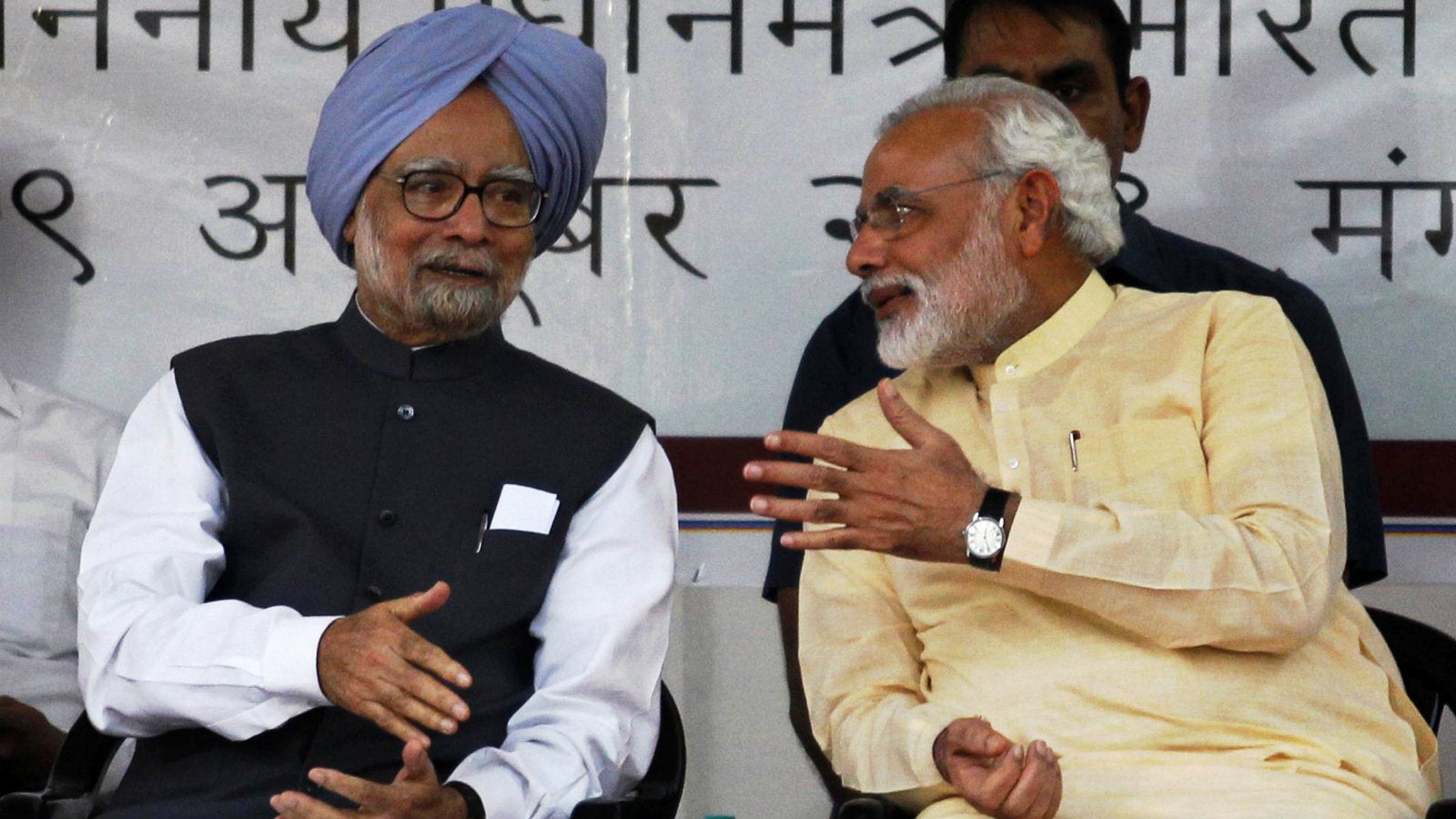Gujarat elections: Manmohan hits back with gusto, as Modi’s Pakistan theory crumbles
The ongoing electoral battle in Gujarat has resulted in a clash between two Indian prime ministers—one former, the other incumbent—casting a shadow on some high constitutional offices of the world’s largest democracy.


The ongoing electoral battle in Gujarat has resulted in a clash between two Indian prime ministers—one former, the other incumbent—casting a shadow on some high constitutional offices of the world’s largest democracy.
On Dec. 10, prime minister Narendra Modi alleged that Pakistan was trying to influence the results of the Gujarat polls by colluding with the Congress party. To make his case, he referred to a recent dinner meeting at Congress leader Mani Shankar Aiyar’s New Delhi residence, attended by former officials from the neighbouring country and Indian guests such as former prime minister Manmohan Singh and a former army chief.
Modi’s broadside has now managed to provoke Singh.
Seen or heard even less since he lost power in 2014, Singh, much to the chagrin of the Modi government, manages to carry gravitas on the rare occasion that he speaks up. But then, these are also times when it doesn’t take much to project gravitas in India, just a little decency of tone and choice of words does the trick.
Desperate measures
“Sadly & regrettably, shri Modi is setting a dangerous precedent by his insatiable desire to tarnish every constitutional office, including that of a former prime minister and army chief…I sincerely hope that (the) prime minister will show the maturity and gravitas expected of the high office he holds instead of concentrating his energy solely on erroneously conceived brownie points,” a statement issued by Singh on Dec. 11 said.
He was responding to Modi’s allegations made a day earlier at an election rally in north Gujarat’s Palanpur town. The Indian prime minister cited “media reports” to insinuate that Pakistan was helping the Congress fight him and the Bharatiya Janata Party (BJP).
“…a meeting at Mani Shankar Aiyar’s house in which Pakistan’s high commissioner, Pakistan’s former foreign minister, India’s former vice-president and former prime minister Manmohan Singh were present,” Modi reportedly said. “On one hand, Pakistan Army’s former DG (director general) is interfering in Gujarat’s election. On the other, Pakistani people are holding a secret meeting at Mani Shankar Aiyar’s house…Don’t you think such events raise doubts here?” Modi said.
He was referring to a dinner meeting held at Aiyar’s home on Dec. 06, during the visit of Pakistan’s former foreign affairs minister Khurshid Mahmud Kasuri. The meeting was attended by, among others, former army chief Deepak Kapoor, former foreign minister K Natwar Singh, and former diplomats Salman Haidar, TCA Raghavan, Sharat Sabharwal, K Shankar Bajpai, and Chinmaya Gharekhan, besides Singh and a handful of Pakistani dignitaries.
Modi’s allegation, coming amid the Gujarat campaign, was obviously well thought out.
The BJP faces palpable anti-incumbency in the western Indian state where the ruling party is desperate to retain power after 22 years of having been in control. Gujarat is also Modi’s primary claim to fame, courtesy his long track record as its chief minister. With the next Indian general election due in mid-2019, for the BJP and Modi, there can be no two ways about convincingly winning Gujarat. And what has added to their consternation is a new spring in the step of the Congress party in the state, particularly under its leader Rahul Gandhi.
So the prime minister has deployed the usual toolbox of Indian politicians—nationalist rhetoric, religious polarisation, and lampooning the Gandhi family. His innuendos about the Congress being in cahoots with the Pakistani establishment is a sure-shot way of polarising voters in a communally sensitive state that also borders the neighbouring country.
Yet, Modi’s electoral tactic is unprecedented because his allegations go beyond just the rival Congress. In broad strokes, they seek to tar constitutional posts, an army chief, and reputed senior diplomats with the “anti-national” slur.
Questions and more
The former prime minister’s ire was obvious. The Congress needs “no sermons on nationalism” from a party and prime minister whose compromised track record on fighting terrorism is well known, Singh’s statement said. “My track record of public service to the country over last five decades is known to everyone. No one, including shri Modi, can lamely question it to gain lost political ground,” he added.
To rub it in, he reminded the prime minister of some embarrassing tactical failures of his own. Singh cited Modi’s “uninvited visit” to Pakistan in December 2015 following the terrorist attacks in Punjab and Kashmir. He also reminded Modi how officials of the Pakistani spy agency, ISI, were allowed into the strategic Pathankot air base in Punjab, to probe a terror attack allegedly sponsored by the neighbouring country itself.
It is too early to say, but Singh’s strong riposte to Modi could also be a sign of changes afoot in the Congress party. After almost two decades at its helm, president Sonia Gandhi recently made way for her son, Rahul, to take charge—uncontested despite a show of following the electoral process.
Chosen by the senior Gandhi as prime minister in 2004, Singh’s two terms as the nation’s leader saw him being pilloried as a puppet of 10 Janpath, Gandhi’s New Delhi residence. Of late, Gandhi herself has been out of action mostly, with her son handling things long before officially replacing her. Now that Rahul is charge, his newfound energy and political approach could rub off on the party.
Singh’s vigorous comeback may be the first sign that the Congress is not going to lie low anymore as Modi runs rampage with rhetoric.